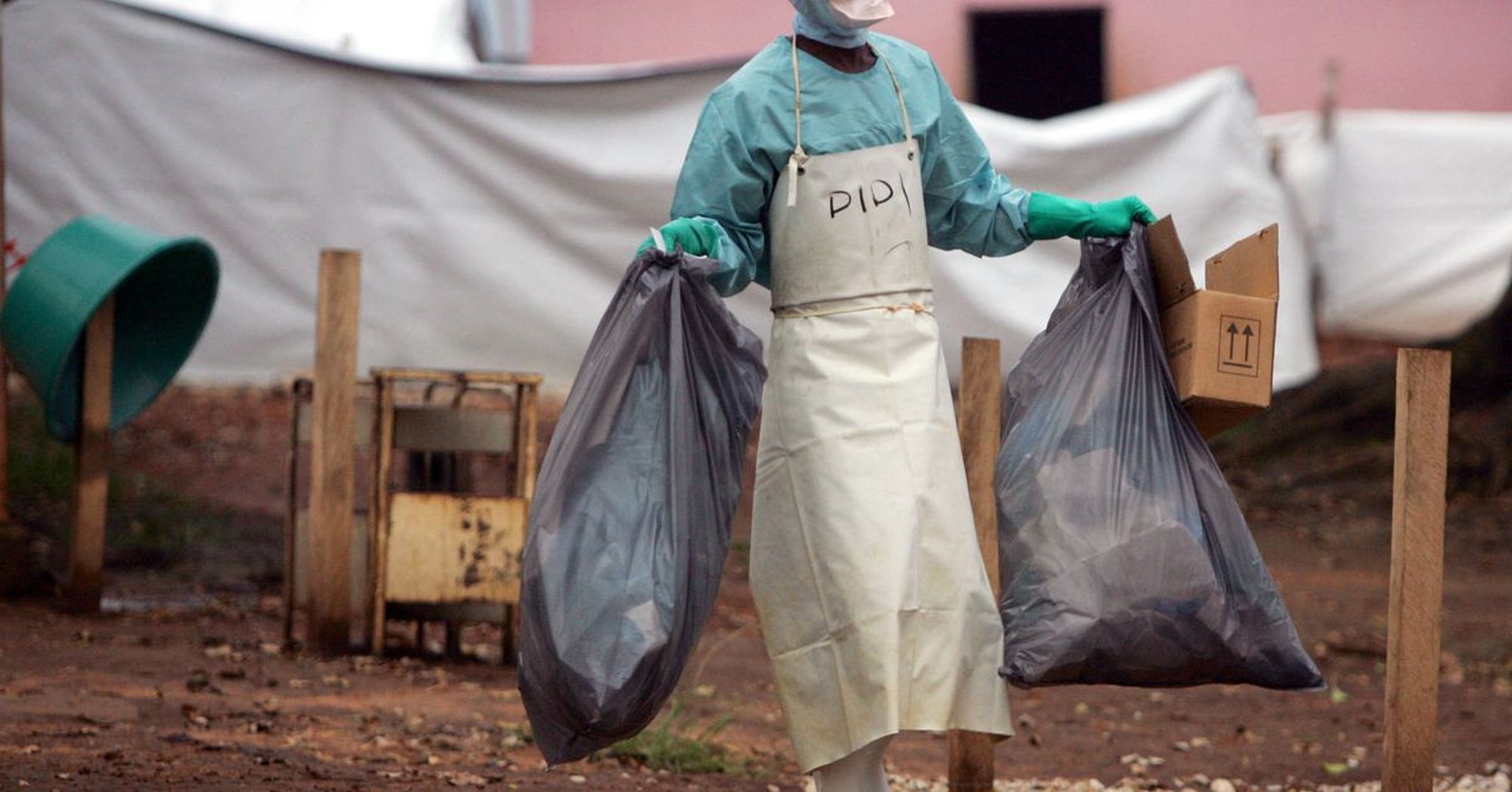Health
A new virus Marburg has been detected in Ghana

|
|
Accra, Ghana- The World Health Organization (WHO), has raised a new alarm over a new virus in Ghana called Marburg similar to the Ebola-like virus.
Marburg is a highly infectious viral hemorrhagic fever in the same family as the better-known Ebola virus disease and has a fatality ratio of up to 88 percent. The virus is transmitted to humans from fruit bats and can then be spread human to human through direct contact with the bodily fluids of infected people or surfaces and materials contaminated with these fluids.
The announcement comes after two unrelated patients from the southern Ashanti region of Ghana, both of whom later died, tested positive for the virus after their samples were sent to the Pasteur Institute in Senegal, which confirmed the diagnosis.
According to WHO, the patients had shown symptoms including diarrhea, fever, nausea, and vomiting. One of the patients was 26 years old and the other was 51.
Now, more than 90 contacts of the two patients have been identified and are being monitored by both the WHO and regional health authorities. The global health agency says it is also assisting Ghana by providing protective equipment, bolstering disease surveillance, testing, tracing contacts and increasing public awareness of the risks and dangers of the disease.
“Health authorities have responded swiftly, getting a head start preparing for a possible outbreak. This is good because, without immediate and decisive action, Marburg can easily get out of hand. WHO is on the ground supporting health authorities and now that the outbreak is declared, we are marshalling more resources for the response,” said Dr. Matshidiso Moeti, WHO Regional Director for Africa.
Death most often happens on day eight or nine after symptoms, following severe blood loss and shock. Drugs and immune therapies to treat Marburg are being developed but there is not yet a vaccine, though early rehydration and treatment of symptoms can improve the chances of survival.
The Ghana Health Service has urged the Ghanaian public to avoid mines and caves occupied by fruit bats and to thoroughly cook all meat products before consumption, to help reduce the risk of spreading the virus. Fruit bats are natural hosts of the Marburg virus, the health service said. The Ghana outbreak is only the second in West Africa after Guinea detected the virus last year. The patient in the Guinea outbreak also died from the virus. No further cases were confirmed by Guinean health authorities.
Health
Interior Health delivers nearly 800K immunization doses in 2023
|
|
Interior Health says it delivered nearly 800,000 immunization doses last year — a number almost equal to the region’s population.
The released figure of 784,980 comes during National Immunization Awareness Week, which runs April 22-30.
The health care organization, which serves a large area of around 820,000, says it’s using the occasion to boost vaccine rates even though there may be post-pandemic vaccine fatigue.
“This is a very important initiative because it ensures that communicable diseases stay away from a region,” said Dr. Silvina Mema of Interior Health.
However, not all those doses were for COVID; the tally includes childhood immunizations plus immunizations for adults.
But IHA said immunizations are down from the height of the pandemic, when COVID vaccines were rolled out, though it seems to be on par with previous pre-pandemic years.
Interior Health says it’d like to see the overall immunization rate rise.
“Certainly there are some folks who have decided a vaccine is not for them. And they have their reasons,” said Jonathan Spence, manager of communicable disease prevention and control at Interior Health.
“I think there’s a lot of people who are hesitant, but that’s just simply because they have questions.
“And that’s actually part of what we’re celebrating this week is those public health nurses, those pharmacists, who can answer questions and answer questions with really good information around immunization.”
Mima echoed that sentiment.
“We take immunization very seriously. It’s a science-based program that has saved countless lives across the world and eliminated diseases that were before a threat and now we don’t see them anymore,” she said.
“So immunization is very important.”




Health
Remnants of bird flu virus found in pasteurized milk, FDA says


|
|
The U.S. Food and Drug Administration said Tuesday that samples of pasteurized milk had tested positive for remnants of the bird flu virus that has infected dairy cows.
The agency stressed that the material is inactivated and that the findings “do not represent actual virus that may be a risk to consumers.” Officials added that they’re continuing to study the issue.
“To date, we have seen nothing that would change our assessment that the commercial milk supply is safe,” the FDA said in a statement.
The announcement comes nearly a month after an avian influenza virus that has sickened millions of wild and commercial birds in recent years was detected in dairy cows in at least eight states. The Agriculture Department says 33 herds have been affected to date.
FDA officials didn’t indicate how many samples they tested or where they were obtained. The agency has been evaluating milk during processing and from grocery stores, officials said. Results of additional tests are expected in “the next few days to weeks.”
The PCR lab test the FDA used would have detected viral genetic material even after live virus was killed by pasteurization, or heat treatment, said Lee-Ann Jaykus, an emeritus food microbiologist and virologist at North Carolina State University
“There is no evidence to date that this is infectious virus and the FDA is following up on that,” Jaykus said.
Officials with the FDA and the USDA had previously said milk from affected cattle did not enter the commercial supply. Milk from sick animals is supposed to be diverted and destroyed. Federal regulations require milk that enters interstate commerce to be pasteurized.
Because the detection of the bird flu virus known as Type A H5N1 in dairy cattle is new and the situation is evolving, no studies on the effects of pasteurization on the virus have been completed, FDA officials said. But past research shows that pasteurization is “very likely” to inactivate heat-sensitive viruses like H5N1, the agency added.
Matt Herrick, a spokesman for the International Dairy Foods Association, said that time and temperature regulations for pasteurization ensure that the commercial U.S. milk supply is safe. Remnants of the virus “have zero impact on human health,” he wrote in an email.
Scientists confirmed the H5N1 virus in dairy cows in March after weeks of reports that cows in Texas were suffering from a mysterious malady. The cows were lethargic and saw a dramatic reduction in milk production. Although the H5N1 virus is lethal to commercial poultry, most infected cattle seem to recover within two weeks, experts said.
To date, two people in U.S. have been infected with bird flu. A Texas dairy worker who was in close contact with an infected cow recently developed a mild eye infection and has recovered. In 2022, a prison inmate in a work program caught it while killing infected birds at a Colorado poultry farm. His only symptom was fatigue, and he recovered.
___
The Associated Press Health and Science Department receives support from the Howard Hughes Medical Institute’s Science and Educational Media Group. The AP is solely responsible for all content.




Health
Canada Falling Short in Adult Vaccination Rates – VOCM


Canada is about where it should be when it comes to childhood vaccines, but for adult vaccinations it’s a different story.
Dr. Vivien Brown of Immunize Canada says the overall population should have rates of between 80 and 90 per cent for most vaccines, but that is not the case.
She says most children are in that range but not for adult vaccines and ultimately the most at-risk populations are not being reached.
She says the population is under immunized for conditions such as pneumonia, shingles, tetanus, and pertussis.
Brown wants people to talk with their family physician or pharmacist to see if they are up-to-date on vaccines, and to get caught up because many are “killer diseases.”
-



 Health3 hours ago
Health3 hours agoRemnants of bird flu virus found in pasteurized milk, FDA says
-
Art9 hours ago
Mayor's youth advisory council seeks submissions for art gala – SooToday
-



 Science17 hours ago
Science17 hours ago"Hi, It's Me": NASA's Voyager 1 Phones Home From 15 Billion Miles Away – NDTV
-
Art21 hours ago
Made Right Here: Woodworking art – CTV News Kitchener
-
News15 hours ago
Some Canadians will be digging out of 25+ cm of snow by Friday – The Weather Network
-
Real eState20 hours ago
Caution about Canada's private real estate sector abounds as valuations slow to adjust – The Globe and Mail
-



 Sports18 hours ago
Sports18 hours agoAuston Matthews turns it up with three-point night as Maple Leafs slay Bruins in Game 2 – Toronto Sun
-
Media14 hours ago
Jon Stewart Slams the Media for Coverage of Trump Trial – The New York Times











